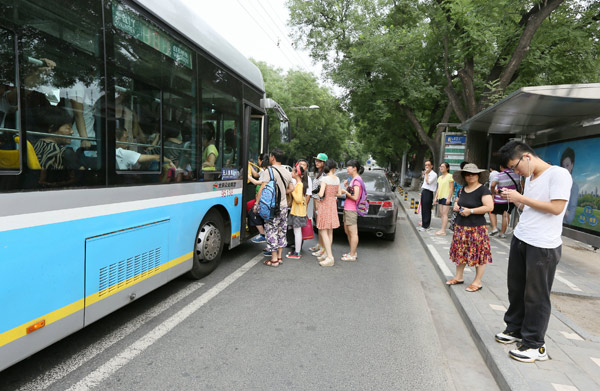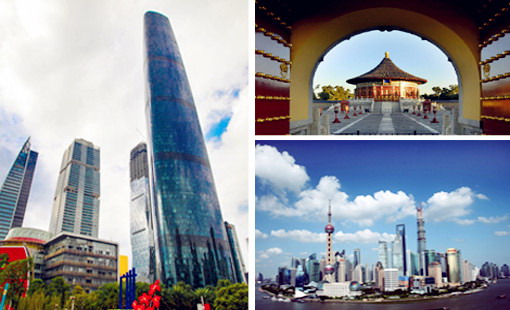Construction of parking lots still in slow lane
Updated: 2013-08-16 07:43
By Cao Yin and Zhang Yuchen in Beijing, and Wang Ying in Shanghai (China Daily)
|
||||||||
 |
|
Parking in inappropriate places, such as bus lanes, often results in traffic jams in downtown Beijing. Provided to China Daily |
Bogus wardens
In addition to these issues, new problems have arisen recently, such as bogus wardens who issue fake parking fee receipts that unscrupulous drivers use to make money from their company expense accounts, said Liu Xuming, a prosecutor in Dongcheng district.
Between January and June, Dongcheng district dealt with the six cases of people suspected of either masquerading as wardens or of using fake receipts. One of the suspects, a man surnamed Zhu, is accused of illegally charging drivers in the area around Hepingli Hospital in Chaoyang district. He netted almost 3,000 yuan during a two-week period, much more than his monthly salary, according to Liu.
In the past, misdemeanors such as this were punished by fines, but a recent change in the law means those who pose as wardens or who produce and sell fake invoices in amounts of more than 100, or to the sum of 400,000 yuan and more, face two years in prison.
Li Long, another prosecutor in the authority, said wardens should hand in invoice fees to their companies, but they will make more money at little cost if they buy fakes.
In one case, a man bought 200 fake invoices at 25 yuan each. However, the face value was 500 yuan, so he made 475 yuan every time he presented one of the receipts, said Li.
However, collecting evidence of wrongdoing is difficult, said Zhou Zhijun, a prosecutor at the Chaoyang investigation department.
"So many people park cars every day, it's hard to work out who is buying the fake receipts or how many have been sold," said Zhou. "Sometime we catch people red-handed, but they usually only carry a small number of receipts and that makes it difficult to prosecute them."
Zhou and Li suggested that point-of-sale machines should be used to collect parking fees; drivers could either swipe a prepaid card or use a credit card to pay, thus reducing the incidence of fraud and lowering the cost of hiring so many wardens.
However, Wang said the plan would be impractical "because the companies would have to invest a large amount to establish the system and monitoring the machines would take up too much time."
Coordinating authority
Zhu Tao, a lecturer at the school of sociology at Beijing University of Technology, said an overall coordinating authority should be established to tackle the capital's parking problems.
"There's a lack of focused management, and governance is weak. The municipal government should think about giving power to a parking authority that could handle all the issues such as planning, building and pricing the lots, plus regulating and managing all the facilities and their use," he said. Zhu suggested that the city government could learn from the experiences of other large cities, both in China and overseas.
Shanghai, one of China's largest municipalities, is also exploring developments in the field of parking.
By June 2012, the city had 389,000 parking lots, providing space for 80 million cars annually, according to Zhou Huai, deputy director of the Shanghai Transportation and Harbor Administration at a media briefing held by the local government.
To improve the efficiency of public parking lots, the city has set up 267 information boards in the downtown districts of Huangpu, Xuhui, Jing'an, Changning and Yangpu. The boards provide drivers with information about the availability, location and fees of 193 parking lots in those areas, said Zhou.
The city will also add more than 10,000 parking spaces this year. They will be located in residential areas and close to hospitals and schools, according to the news portal People, which cited the Shanghai Static Traffic Management Work Conference.
In Beijing, the State-run Beijing Gonglian Co is the biggest player in the field of parking management, far overshadowing its rivals. That's an unhealthy situation, according to Ding.
"A lack of efficient competition in the market and an unfair pricing system means the parking business in Beijing is in poor shape," he said. Ding urged greater competition among parking-management companies and also suggested that communities and government departments should allow drivers to rent prepaid parking spaces that are unoccupied during the day when their owners are at work: "In this way, the pressure on the side-of-the-road parking areas would be alleviated, and we could make full use of these temporarily unoccupied spaces."
Contact the writers at caoyin@chinadaily.com.cn and zhangyuchen@chinadaily.com.cn

 Demolition work starts on rooftop villa structure
Demolition work starts on rooftop villa structure
 Thrills in store for Chicago Air and Water Show
Thrills in store for Chicago Air and Water Show
 Memorial to expeditionary soldiers opens
Memorial to expeditionary soldiers opens
 Death toll from Egypt violence rises to 638
Death toll from Egypt violence rises to 638
 Tunes that travel
Tunes that travel
 Macabre Addams Family tests musical tastes
Macabre Addams Family tests musical tastes
 Spielberg has desire to work with Zhang Yimou
Spielberg has desire to work with Zhang Yimou
 Li Na advances to 3rd round at Cincinnati Open
Li Na advances to 3rd round at Cincinnati Open
Most Viewed
Editor's Picks

|

|

|

|

|

|
Today's Top News
No remorse as Abe marks surrender anniversary
China to be world's No 1 consumer
China Mobile looks to data services
Beijing, Moscow hail military ties
Japan exports to China at lowest in four years
Fish ecosystem 'on verge of collapse'
First public rental housing fund launched
Trimming standard ideas of butchering
US Weekly

|

|







